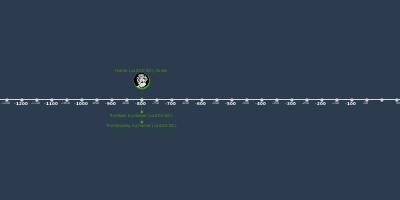Xenophanes (ca 570 - ca 478 BC), Greek (1 jan 570 ano antes da era comum – 1 jan 478 ano antes da era comum)
Descrição:
From Colophon in Ionia
Key ideas:
- Negative account of the divine:
- Critical of Hesiod's and Homer's conceptions of the gods as having flaws and acting scandalous.
- Critical of people's conceptions of the gods, which are anthropomorphic: "Mortals suppose that gods are born, wear their own clothes and have a voice and body”. “Ethiopians say that their gods are snub-nosed and dark, Thracians, that theirs are blue-eyed and red-haired." And if horses, oxen, and lions were able to draw pictures, they would depict equine, bovine, and leonine gods.
- Positive account of the divine:
- Monotheism [?]: There is "One god, greatest among gods and men. Not at all like mortals in body or in thought." He does not move but shakes everything with the thought of his mind. He sees, hears and thinks everything. God, in other words, has perfect knowledge, whereas we only have belief or opinion:
- Skepticism: "And of course the clear and certain truth no man has seen, nor will there be anyone who knows about the gods and what I say about all things; for even if, in the best case, he should chance to speak what is the case,
all the same, he himself does not know; but opinion is found over all."
- Nevertheless, through inquiry we may understand things better.
- This passage may be only about God and metaphysical matters. We may have clear and certain knowledge of more mundane directly observable things.
- Knowledge vs. true opinion.
- All/many natural phenomena are (explained by) clouds.
- Earth as the arche [?]: "All things are from the earth and to the earth all things come in the end." But compare: "All things which come into being and grow, are earth and water."
Key works:
- None of his writings remains.
Misc.:
- A poet-sage or rhapsode who travelled around Greece and settled in Sicily and later in Elea.
- Later writers identified Xenophanes as the teacher of Parmenides and founder of the Eleatic school of philosophy (i.e. the view that, despite appearances, what there is is a motionless, changeless, and eternal ‘One’).
Links:
<https://plato.stanford.edu/entries/xenophanes/>
<https://plato.stanford.edu/entries/presocratics/>
<https://www.iep.utm.edu/presocra/>
<https://www.iep.utm.edu/xenoph/>
Adicionado na linha do tempo:

Western history
Data:
Imagens:
![]()
